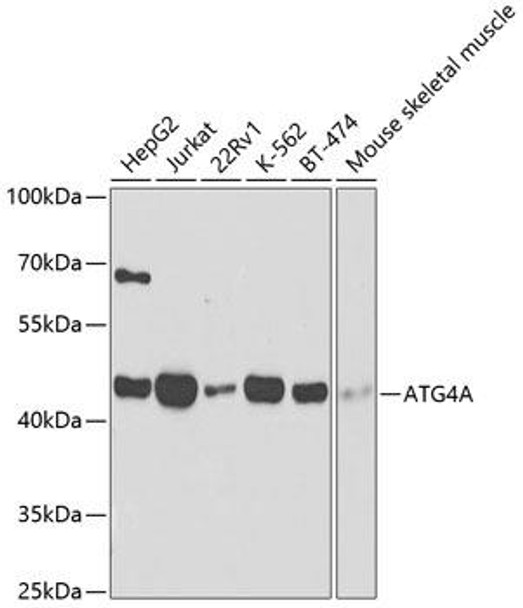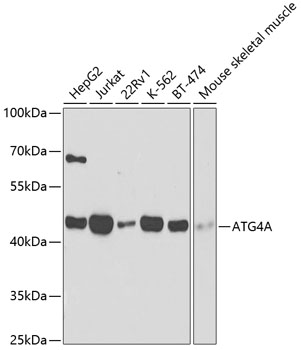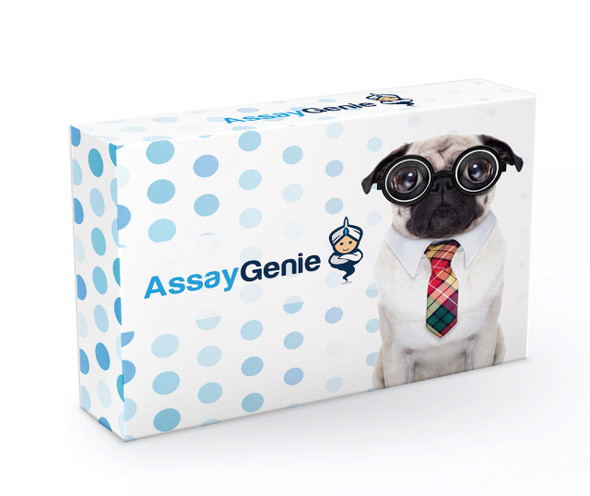Autophagy Antibodies
Anti-ATG4A Antibody (CAB2598)
- SKU:
- CAB2598
- Product Type:
- Antibody
- Reactivity:
- Human
- Reactivity:
- Mouse
- Host Species:
- Rabbit
- Isotype:
- IgG
- Research Area:
- Autophagy
Description
| Antibody Name: | Anti-ATG4A Antibody |
| Antibody SKU: | CAB2598 |
| Antibody Size: | 20uL, 50uL, 100uL |
| Application: | WB |
| Reactivity: | Human, Mouse |
| Host Species: | Rabbit |
| Immunogen: | Recombinant fusion protein containing a sequence corresponding to amino acids 289-398 of human ATG4A (NP_443168.2). |
| Application: | WB |
| Recommended Dilution: | WB 1:500 - 1:2000 |
| Reactivity: | Human, Mouse |
| Positive Samples: | HepG2, Jurkat, 22Rv1, K-562, BT-474, Mouse skeletal muscle |
| Immunogen: | Recombinant fusion protein containing a sequence corresponding to amino acids 289-398 of human ATG4A (NP_443168.2). |
| Purification Method: | Affinity purification |
| Storage Buffer: | Store at -20'C. Avoid freeze / thaw cycles. Buffer: PBS with 0.02% sodium azide, 50% glycerol, pH7.3. |
| Isotype: | IgG |
| Sequence: | TEEN GTVN DQTF HCLQ SPQR MNIL NLDP SVAL GFFC KEEK DFDN WCSL VQKE ILKE NLRM FELV QKHP SHWP PFVP PAKP EVTT TGAE FIDS TEQL EEFD LEED FEIL SV |
| Gene ID: | 115201 |
| Uniprot: | Q8WYN0 |
| Cellular Location: | Cytoplasm |
| Calculated MW: | 36kDa/38kDa/42kDa/45kDa |
| Observed MW: | 45kDa |
| Synonyms: | ATG4A, APG4A, AUTL2 |
| Background: | Autophagy is the process by which endogenous proteins and damaged organelles are destroyed intracellularly. Autophagy is postulated to be essential for cell homeostasis and cell remodeling during differentiation, metamorphosis, non-apoptotic cell death, and aging. Reduced levels of autophagy have been described in some malignant tumors, and a role for autophagy in controlling the unregulated cell growth linked to cancer has been proposed. This gene encodes a member of the autophagin protein family. The encoded protein is also designated as a member of the C-54 family of cysteine proteases. |
| UniProt Protein Function: | ATG4A: Cysteine protease required for autophagy, which cleaves the C-terminal part of either MAP1LC3, GABARAPL2 or GABARAP, allowing the liberation of form I. A subpopulation of form I is subsequently converted to a smaller form (form II). Form II, with a revealed C-terminal glycine, is considered to be the phosphatidylethanolamine (PE)-conjugated form, and has the capacity for the binding to autophagosomes. Preferred substrate is GABARAPL2 followed by MAP1LC3A and GABARAP. Widely expressed, at a low level, and the highest expression is observed in skeletal muscle and brain. Also detected in fetal liver. Inhibited by N-ethylmaleimide. Belongs to the peptidase C54 family. 4 isoforms of the human protein are produced by alternative splicing. |
| UniProt Protein Details: | Protein type:Microtubule-binding; Autophagy; EC 3.4.22.-; Protease Chromosomal Location of Human Ortholog: Xq22.3 Cellular Component: cytoplasm; cytosol Molecular Function:cysteine-type endopeptidase activity; cysteine-type peptidase activity Biological Process: protein delipidation; mitochondrion degradation; protein processing; C-terminal protein lipidation; protein targeting to membrane; proteolysis; cellular response to nitrogen starvation; autophagic vacuole formation |
| NCBI Summary: | Autophagy is the process by which endogenous proteins and damaged organelles are destroyed intracellularly. Autophagy is postulated to be essential for cell homeostasis and cell remodeling during differentiation, metamorphosis, non-apoptotic cell death, and aging. Reduced levels of autophagy have been described in some malignant tumors, and a role for autophagy in controlling the unregulated cell growth linked to cancer has been proposed. This gene encodes a member of the autophagin protein family. The encoded protein is also designated as a member of the C-54 family of cysteine proteases. Transcript variants that encode distinct isoforms have been identified. [provided by RefSeq, Jul 2008] |
| UniProt Code: | Q8WYN0 |
| NCBI GenInfo Identifier: | 61211859 |
| NCBI Gene ID: | 115201 |
| NCBI Accession: | Q8WYN0.1 |
| UniProt Secondary Accession: | Q8WYN0,O95534, Q5JYY9, Q5JYZ0, Q86VE5, Q96KQ0, Q96KQ1 A6NCH2, B2RAZ7, D3DUY0, |
| UniProt Related Accession: | Q8WYN0 |
| Molecular Weight: | 398 |
| NCBI Full Name: | Cysteine protease ATG4A |
| NCBI Synonym Full Names: | autophagy related 4A, cysteine peptidase |
| NCBI Official Symbol: | ATG4A |
| NCBI Official Synonym Symbols: | APG4A; AUTL2 |
| NCBI Protein Information: | cysteine protease ATG4A; hAPG4A; autophagin 2; autophagin-2; APG4 autophagy 4 homolog A; AUT-like 2 cysteine endopeptidase; ATG4 autophagy related 4 homolog A; AUT-like 2, cysteine endopeptidase; autophagy-related protein 4 homolog A; autophagy-related cysteine endopeptidase 2 |
| UniProt Protein Name: | Cysteine protease ATG4A |
| UniProt Synonym Protein Names: | AUT-like 2 cysteine endopeptidase; Autophagin-2; Autophagy-related cysteine endopeptidase 2; Autophagy-related protein 4 homolog A; hAPG4A |
| Protein Family: | Cysteine protease |
| UniProt Gene Name: | ATG4A |
| UniProt Entry Name: | ATG4A_HUMAN |
View AllClose



![Anti-ATG4A Antibody (CAB19844)[KO Validated] Anti-ATG4A Antibody (CAB19844)[KO Validated]](https://cdn11.bigcommerce.com/s-rd6ounxcu2/images/stencil/590x590/products/56016/61198/anti-atg4a-antibody-cab19844ko-validated__38997__39638.1706533736.jpg?c=1)



